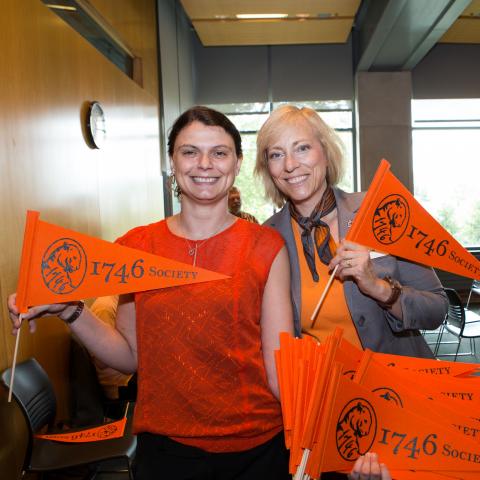1746 Society Webinars
1746 Society Webinars

Listen and learn from alumni experts speaking on a range of estate planning topics.
Stay informed on upcoming webinars. Contact Gift Planning at GiftPlanning@princeton.edu or 609.258.6318 for more information.

Past Webinars
-
Presented by Skip Fox ’75, retired partner of McGuire Woods LLP, on Jan. 14, 2026
Fox, an expert in estate planning, trust and estate administration, and charitable organizations, reveals how charitable giving enhances your personal planning for yourself, your family and charities like Princeton that are important to you.
A retired partner of McGuire Woods LLP, Fox has lectured extensively on estate planning, served as an adjunct professor at the law schools of Northwestern University and the University of Virginia, is a past president of the American College of Trust and Estate Counsel and is in the NAEPC Estate Planning Hall of Fame. He currently serves as class agent for the Great Class of 1975 and on Princeton’s Planned Giving Advisory Committee.
-
Presented by Jennifer Jordan McCall ’78, co-leader of both the Private Wealth and the Litigation – Trusts, Estates and High Net Worth teams of Pillsbury Winthrop Shaw Pittman LLP, on September 25, 2025
Jennifer Jordan McCall ’78 P10 P11 P13 P14 is an award-winning authority on U.S. and international gift and estate planning, as well as co-chair of Princeton’s Planned Giving Advisory Committee. McCall crafts tax-saving business succession and estate transfer plans that preserve wealth and enhance family relationships. Her clients include internationally renowned museums and corporations, charities, foundations, high-net-worth families and individuals, fiduciaries and nonprofits.
-
Presented by Gary Snerson, Senior Vice President, Non-Cash Assets, at Charitable Solutions LLC, on Nov. 14, 2024
Real estate can be a tax-wise way to support causes you care about and realize your philanthropic goals. This webinar will cover the most common (and a few less common) cases for making a gift using various types of real estate holdings, along with the tax implications and pitfalls to avoid.
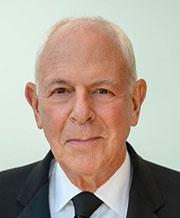
Attorney Gary Snerson is an expert in non-cash asset giving. Prior to his current position, he served as the senior vice president of Estates and Special Investments at the Harvard Endowment for 15 years, where he also worked extensively with development officers throughout Harvard University on a variety of planned gifts funded with traditional and unique assets, from inter vivos and testamentary charitable remainder unitrusts and charitable lead trusts to retained life estates and bequests. For 25 years prior to his position at Harvard, Snerson practiced law in Boston, Massachusetts, and specialized in estate planning and trust administration. His practice also included business and commercial real estate law. Snerson has taught numerous undergraduate and graduate courses in finance, law, negotiation and estate planning at several Boston area institutions including Bentley University, Boston University and Lesley University. He is a sought-after speaker on the topic of non-cash giving at national and regional conferences and philanthropic planning groups, including the NEPGG, IMI Institute and the Ivy League Plus Planned Giving Group.
-
November 13, 2025
-
Led by Skip Fox ’75 on October 5, 2023
-
Presented by Gift Planning staff on October 22 and 28, 2020
Heading for your 50th Reunion or beyond? Learn how you can make a significant gift for your major reunion, while providing for yourself and/or your beneficiaries through the Annual Giving Legacy Program.
Gifts made in the form of a gift annuity or charitable trust — gifts that make payments to the donor or other beneficiaries for life or a term — can now be credited to reunion giving campaigns starting at the 50th. Learn about the tax considerations and ways donors use these giving structures to diversify their retirement income, avoid or reduce capital gains tax, and move assets out of their estate.
-
Presented by Conrad Teitell, Chairman, Charitable Planning Group, Cummings & Lockwood LLC, on June 16, 2020
Learn — and get some laughs along the way — about how a charitable life-income plan can pay you (and another) income for life; give you an income tax charitable deduction now for assets that go to charity after life; enable you to reinvest appreciated investments with no or reduced capital gains taxes; and make important charitable gifts. Charitable tax incentives for this year under the CARES Act and a host of other tax-smart philanthropy ideas will be explained.
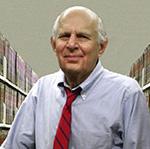
Attorney Conrad Teitell has made charitable and estate planning understandable and entertaining in all 50 states, on PBS and on NPR’s “Marketplace.” He is a principal in the Connecticut and Florida law firm of Cummings & Lockwood, and chairs the firm’s National Charitable Planning group. An adjunct professor at the University of Miami’s School of Law, he has lectured and written extensively on taxes, estate planning and philanthropy, and appeared before the U.S. Senate Finance Committee on estate tax revision. He is known for his ability to translate complicated laws understandable with dry wit.
-
Presented by Charles “Skip” D. Fox ’75, Partner, McGuireWoods, on June 4, 2020
Signed into legislation on March 27, the $2 billion stimulus bill known as the CARES Act (Coronavirus Aid, Relief, and. Economic Security Act) provides relief to individuals and businesses negatively impacted by coronavirus through direct aid, loans, tax incentives, and more. This webinar will give an overview of recent COVID-19 relief legislation and the implications to tax, business, and charitable planning.
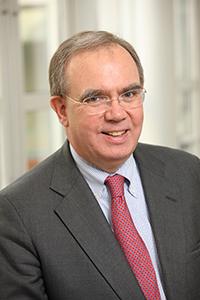
Skip Fox, a former chair of McGuireWoods’ Tax and Employee Benefits Department and of the Private Wealth Services Group, is an influential voice in shaping U.S. estate tax policy and legislation, having worked for more than 25 years with groups interested in reforming the federal tax system. His focus is estate planning, estate administration, trust law, and charitable organizations. He recently completed a term as president of the American College of Trust and Estate Counsel (ACTEC) and is an adjunct professor at the University of Virginia School of Law. Skip serves on the faculty of the National Trust School and the National Graduate Trust School, where he has taught many of the leaders of trust organizations throughout the country for over 30 years. He has been a member of the editorial board of Trusts & Estates and chaired the board of Trust & Investments, two leading industry publications. He has written or co-written seven books and numerous articles for many different publications. He has co-presented the American Bankers Association’s monthly teleconferences on trusts and estates topics since 2000 and co-wrote a monthly column on tax subjects for the ABA Trust newsletter for 18 years.
-
Presented by G. Scott Clemons ’90, Partner, Chief Investment Strategist, Private Wealth Management, Brown Brothers Harriman, on May 11, 2020
The COVID-19 crisis poses unprecedented challenges to public health, our economy, and financial markets. Even when the health risks begin to recede, the task of restarting economic growth looms large, with implications for businesses and investors alike. This webinar will consider the economy and financial markets in the age of COVID-19.
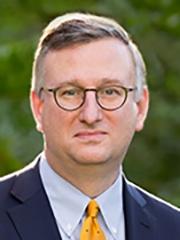
Scott Clemons joined BBH&Co. in 1990, and has held a variety of investment roles at the firm over the past 29 years. His career began in international equities, where he was an analyst and portfolio manager of European and Asian equities, working out of the firm’s New York and London offices throughout the 1990s. In 2001 he broadened his responsibilities into domestic equity management and research as well, and then from 2005 through 2010 managed the New York office of the firm’s Private Wealth Management business. In 2010 he was appointed chief investment strategist, and is today one of the firm’s primary writers and speakers on topics related to the economy, financial markets and investing. Scott is a frequent contributor to print and broadcast media, and appears regularly in the pages of the Wall Street Journal, Financial Times, The New York Times and on camera at CNBC, Bloomberg and CNN. Scott is a Chartered Financial Analyst, and a member of the New York Society of Security Analysts and the CFA Institute. Outside of his professional interests, Scott serves on the boards of the Grolier Club in New York City, as well as the board of the Research Corporation for Science and the Journal of the History of Ideas. Born and raised in Florida, he is a magna cum laude graduate (Classics) of Princeton University, and lives in Manhattan with his wife Karyn, a music teacher at the Brearley School. They are proud parents of young twins.
-
Presented by Charles “Skip” D. Fox ’75, Partner, McGuireWoods, on February 6, 2020
One would think that making gifts to Princeton or any other charity should be simple. However, the federal tax laws governing charitable giving are anything but simple. The failure to comply with these tax laws can cause donors to lose the income tax charitable deduction for gifts made during life or the estate tax charitable deduction for gifts made at death. This webinar session will examine mistakes made by others in making charitable gifts so that your charitable gifts go to charity and you get the full charitable deduction to which you are entitled.

Skip Fox, a former chair of McGuireWoods' Tax and Employee Benefits Department and of the Private Wealth Services Group, is an influential voice in shaping U.S. estate tax policy and legislation, having worked for more than 25 years with groups interested in reforming the federal tax system. His focus is estate planning, estate administration, trust law, and charitable organizations. He recently completed a term as president of the American College of Trust and Estate Counsel (ACTEC) and is an adjunct professor at the University of Virginia School of Law. Skip serves on the faculty of the National Trust School and the National Graduate Trust School, where he has taught many of the leaders of trust organizations throughout the country for over 30 years. He has been a member of the editorial board of Trusts & Estates and chaired the board of Trust & Investments, two leading industry publications. He has written or co-written seven books and numerous articles for many different publications. He has co-presented the American Bankers Association’s monthly teleconferences on trusts and estates topics since 2000 and co-wrote a monthly column on tax subjects for the ABA Trust newsletter for 18 years.
-
Presented by Wade D. Pfau, PhD *03, Professor of Retirement Planning, The American College, on December 4, 2019
For those of us wishing to retire one day, we are increasingly responsible for figuring out how to save during our working years and converting these savings into sustainable income for an ever-lengthening number of retirement years. The nature of risk changes in retirement, as the lifestyles of retirees become more vulnerable to the impacts of market volatility, unknown longevity, and spending shocks. Retirees have one opportunity to build a successful plan. It is not an easy task, but it is manageable. It this webinar we consider retirement risks and how to approach building a plan to meet the financial goals of retirement while managing these risks.

Wade D. Pfau, Ph.D., CFA, is the director of the Retirement Income Certified Professional designation and a professor of retirement income at The American College of Financial Services in King of Prussia, Pa. As well, he is a principal and director for McLean Asset Management. He holds a doctorate in economics from Princeton University and publishes frequently in a wide variety of academic and practitioner research journals on topics related to retirement income. He hosts the Retirement Researcher website, and is a contributor to Forbes, Advisor Perspectives, Journal of Financial Planning, and an expert panelist for the Wall Street Journal. He is the author of the books, “How Much Can I Spend in Retirement? A Guide to Investment-Based Retirement Income Strategies,” and “Reverse Mortgages: How to Use Reverse Mortgages to Secure Your Retirement.”
-
Presented by Gift Planning staff on November 20, 2019
Gifts made in the form of a gift annuity or charitable trust—gifts that make payments to the donor or other beneficiaries for life or a term—can now be credited to reunion giving campaigns starting at the 50th. Learn about the tax considerations and ways donors use these giving structures to diversify their retirement income, avoid or reduce capital gains tax, and move assets out of their estate.
-
Presented by Ron Brown ’72, Author of “A History of Charitable Gift Planning,” on September 11, 2019
Princeton has been shaped by magnificent bequests and planned gifts, from the Scheide Library and the Graduate College campus to founding bequests in the 1700s. This richly illustrated webinar features Princeton heroes such as George Washington and James Madison, gifts of important manuscripts, paintings, and objects, and the fruits of endowed funds.
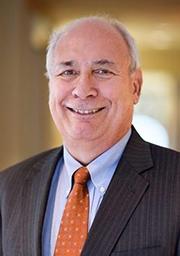
Ron Brown is the author of “A History of Charitable Gift Planning” and many articles. He served as director of planned giving at Princeton (1996-2010). Ron was a board member of the National Association of Charitable Gift Planners and the Philanthropic Planning Group of Greater New York, chair of the Research Committee for the American Council on Gift Annuities, and is a member of Princeton’s Planned Giving Advisory Committee. Ron graduated from Princeton with the Class of 1972 and received an MA from the University of Chicago, where he studied the history of ideas and edited the newsletter of the Oriental Institute. A retired Commander in the U.S. Naval Reserve, he received two Navy and Marine Corps Achievement Medals for writing and research while serving with the U.S. Naval Historical Center. He has two children and two grandchildren, and lives in Manhattan.
-
Presented by Jennifer Jordan McCall ’78, Partner, Estates, Trusts & Tax Planning, Pillsbury Winthrop Shaw Pittman LLP, on October 23, 2019
Most of us work very hard to achieve financial security for ourselves and our families. It can be shocking to find out that falling prey to unforeseen traps may negatively impact our personal and financial safety. Learn how to identify warning signs before issues arise and safeguard your assets and loved ones.
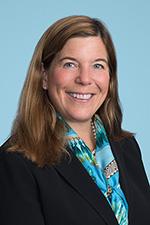
Jennifer Jordan McCall has been recognized by Chambers and Partners for the national, Western and Northern California regions and by Best Lawyers and Super Lawyers in California and New York. She has been named 2019 International Global Business Award’s Trusts and Estates Lawyer of the Year – USA, as well as Wealth Management Lawyer of the Year in California by Corporate INTL (2017-2019), Global 100 (2018), and M&A Today (2017-2018). She is based in the Silicon Valley, New York and Palm Beach offices and represents private clients. Jennifer is admitted to practice law in California, Florida and New York. She is a fellow of the American College of Trust and Estate Counsel (ACTEC), where she serves as a member of the International Tax Planning and Estate and Gift Tax committees. She has lectured extensively and conducts seminars on estate and tax planning.

Gift Planning

Bequest Basics
